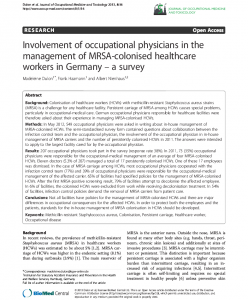Involvement of occupational physicians in the management of MRSA-colonised healthcare workers in Germany — a survey
Deux articles cette semaine sur le dépistage des soignants porteurs de SARM, l’intérêt de la décontamination et le rôle des médecins du travail dans ce contexte.
Auteur Madeleine Dulon
Auteur Frank Haamann
Auteur Albert Nienhaus
Volume 8
Numéro 1
Pages 16
Publication Journal of occupational medicine and toxicology (London, England)
ISSN 1745-6673
Date May 27, 2013
Résumé BACKGROUND: Colonisation of healthcare workers (HCWs) with methicillin-resistant Staphylococcus aureus strains (MRSA) is a challenge for any healthcare facility. Persistent carriage of MRSA among HCWs causes special problems, particularly in occupational-medical care. German occupational physicians responsible for healthcare facilities were therefore asked about their experience in managing MRSA-colonised HCWs. METHODS: In May 2012, 549 occupational physicians were asked in writing about in-house management of MRSA-colonised HCWs. The semi-standardised survey form contained questions about collaboration between the infection control team and the occupational physician, the involvement of the occupational physician in in-house management of MRSA carriers and the number of persistently colonised HCWs in 2011. The answers were intended to apply to the largest facility cared for by the occupational physician. RESULTS: 207 occupational physicians took part in the survey (response rate 38%). In 2011, 73 (35%) occupational physicians were responsible for the occupational-medical management of an average of four MRSA-colonised HCWs. Eleven doctors (5.3% of 207) managed a total of 17 persistently colonised HCWs. One of these 17 employees was dismissed. In the case of MRSA carriage among HCWs, most occupational physicians cooperated with the infection control team (77%) and 39% of occupational physicians were responsible for the occupational-medical management of the affected carrier. 65% of facilities had specified policies for the management of MRSA-colonised HCWs. After the first MRSA-positive screening result, 79% of facilities attempt to decolonise the affected employee. In 6% of facilities, the colonised HCWs were excluded from work while receiving decolonisation treatment. In 48% of facilities, infection control policies demand the removal of MRSA carriers from patient care. CONCLUSIONS: Not all facilities have policies for the management of MRSA-colonised HCWs and there are major differences in occupational consequences for the affected HCWs. In order to protect both the employees and the patients, standards for the in-house management of MRSA colonisation in HCWs should be developed.
L’autre article : Decolonization of patients and health care workers to control nosocomial spread of methicillin-resistant Staphylococcus aureus: a simulation study
Chercher cette référence sur : Google Scholar, Worldcat
doi:10.1186/1745-6673-8-16
Laisser une réponse
Vous devez etre connectez Pour poster un commentaire









